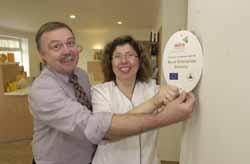
A County Durham farm with a macabre past has become a relaxation haven following the launch of a new day spa, with help from Defra's Rural Enterprise Scheme (RES).
High Hill House Farm was the scene of a triple murder in 1682 when John Brass, 17 and his two sisters Jane, 19 and Elizabeth, ten, were murdered by their father's servant while their parents John and Margaret enjoyed an evening out in nearby Ferryhill, County Durham. The servant Andrew Mills was later executed and hanged in chains.
More than 300 years have now passed and Jill Cheesmond has teamed up with her parents, Ned and Val Cheesmond, and sister and brother-in-law, Dawn and Mark Larn, to create the new spa.
Ms Cheesmond already has more than six years experience as a skincare, spa and holistic therapist and has lectured at local colleges, while her sister Dawn is undergoing training to offer a range of treatments. Thanks to the RES grant, the family have already set about extending and converting a building on the farm to create the spa.
The premises will boast three treatment rooms, a consultation area, kitchen and dining area, changing rooms, an aromatherapy room, sauna, infrared and white light room and a pool.
Ms Cheesmond said:
"My brother used to help run the farm with my parents but when he and his family emigrated we decided to look at others ways to boost the business.
We wanted to be able to make sure we could keep the farm going and this seemed like a great idea, but it would never have been possible without support from RES.
"We offer a whole range of treatments and as it's fairly small it can be hired out exclusively to small groups or individuals, business groups and friends, to spend either a half or full day with us. Alternatively, they can just come along for a single treatment session.
"We're also particularly keen to welcome male clients as many of the treatments we offer have great health benefits."
Ken Haynes, a Defra Rural Development Service adviser, said:
"This new venture should provide a fantastic new facility for this rural area. It represents an innovative solution to the use of redundant building and targets a growth sector within the leisure industry offering long-term sustainability for the farming enterprise and will help to secure and create new jobs, which is one of the key aims of RES."
